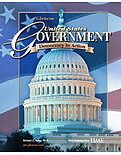U. S. Government: Democracy In ActionChapter 6:
Development of Congressional PowersWeb Activity Lesson PlansIntroduction
In this chapter students learned about the relationship between Congress and the president. They also have learned about constitutional powers, particularly the power of Congress to conduct investigations and practice legislative oversight. Oversight is an important responsibility of Congress and an important feature in our government's system of checks and balances. In this activity students will take a closer look at this function of Congress by studying the report of a bipartisan commission that reviewed intelligence activities. Lesson Description
Students will read the chapter discussing accountability and oversight of the bipartisan Commission on the Roles and Capabilities of the United States Intelligence Community. After studying the chapter, they will answer four questions about what they have read and will create a report recommending improvements to the Congressional oversight process. Instructional Objectives - Students will be able to summarize the ways in which Congress exercises its oversight responsibilities over intelligence activities.
- Students will be able to discuss the unique problems that Congress faces in its oversight over intelligence activities.
Student Web Activity Answers - Congress created special committees in each House, while the executive branch established Inspectors General to oversee intelligence activities.
- U.S. intelligence agencies are bound by the Constitution and laws of the United States and can be held criminally liable or can be subjected to administrative sanctions. In addition, they have to follow policies established by presidential executive orders and guidelines approved by the Attorney General.
- Congress has created oversight committees in each of the Houses: the Select Committee on Intelligence in the Senate and the Permanent Select Committee on Intelligence in the House of Representatives. These committees also authorize appropriations for intelligence activities and have subpoena power.
- (A) The commission points out that because members serve on the committees for a limited number of years, they often rotate off the committees just at the time when they have begun to master the subject matter. Because of the limited tenure, some members may choose to focus their time on other committees. The commission recommends either eliminating tenure entirely or lengthening the time each member can serve on committees. (B) Congressional oversight can have a negative effect on intelligence operations by discouraging risk-taking and innovative thinking, making intelligence officers leery of putting things on paper, and distorting the public's perception of intelligence by reporting mostly on negative issues. While the commission does not make specific recommendations, it points out the need for balancing oversight with allowing intelligence officers to not feel restricted in their activities.
- Students' reports and recommendations will vary but should show an understanding of the problems of balancing oversight with the need for secrecy.
 | 




